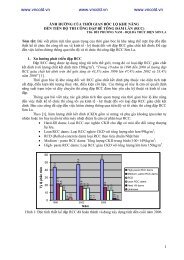Civil Engineering Project Management (4th Edition)
You also want an ePaper? Increase the reach of your titles
YUMPU automatically turns print PDFs into web optimized ePapers that Google loves.
84 <strong>Civil</strong> <strong>Engineering</strong> <strong>Project</strong> <strong>Management</strong><br />
head office. A materials clerk on site then checks the deliveries against the<br />
supplier’s invoices and against the original order, certifies the invoice and sends<br />
it to head office for payment. This system can only work, of course, if both<br />
head office and the site are in the same country. Overseas, the agent has to<br />
carry out all the work involved, using sub-agents and accountants or other<br />
supporting staff to carry out the work for him.<br />
A quantity surveyor (QS) (or surveyors) may be employed on site to draw up<br />
monthly applications for payments due to the contractor, according to the<br />
measurement of work done as required under an Institution of <strong>Civil</strong> Engineers<br />
(ICE) bill-of-quantities contract. Alternatively these QSs – as they are widely<br />
called – may be based in head office visiting site monthly. To them the subagents<br />
or section engineers submit their monthly measurements and the QSs<br />
then make up the monthly statement, including any claims the contractor makes<br />
for additional payment for extra work done, delays or difficulties encountered<br />
which the contractor considers should be met. However, on small jobs quantity<br />
surveyors are not always employed because civil engineering quantities differ<br />
from building quantities (see Sections 15.4–15.7), so the small contractor may<br />
use his engineer for this task or do it himself.<br />
7.5 Accounting methods<br />
While the agent may have wide authority on site, the large sums of money he<br />
commits his firm to spending must come under the control of the contractor’s<br />
head office. For supply of materials in regular use the system described in<br />
the previous section is used, that is, head office places the contracts for supply<br />
as agreed with the agent and pays the suppliers’ invoices for deliveries as<br />
checked by the agent. In this manner the agent does not have to handle large<br />
payments himself.<br />
But the agent will also need to open a local bank account, into which head<br />
office transfer funds for a variety of cash payments – for fuel for vehicles, a<br />
variety of consumables and for the wages of labour taken on by the agent.<br />
These payments have to be handled by the site accountant and his pay clerk<br />
on site. The paysheets are made up by the pay clerk on the basis of time sheets<br />
sent in to him by the men on site, the section foremen or gangers certifying the<br />
timesheets of men working under them. From time to time an accountant from<br />
head office may visit the site to audit the local paysheets and cash disbursements<br />
by the agent.<br />
On overseas projects the large sums of money which have to be expended<br />
locally mean that a fully staffed accountant’s office, under the charge of an<br />
experienced site accountant, will need to be set up.<br />
The monthly returns of local expenditure sent by the agent to head office are<br />
then added to all the payments and charges met by head office and debited to<br />
the job. These will include not only invoices paid for materials delivered to site,<br />
but also all other relevant expenditure, such as salaries of those working on the


















